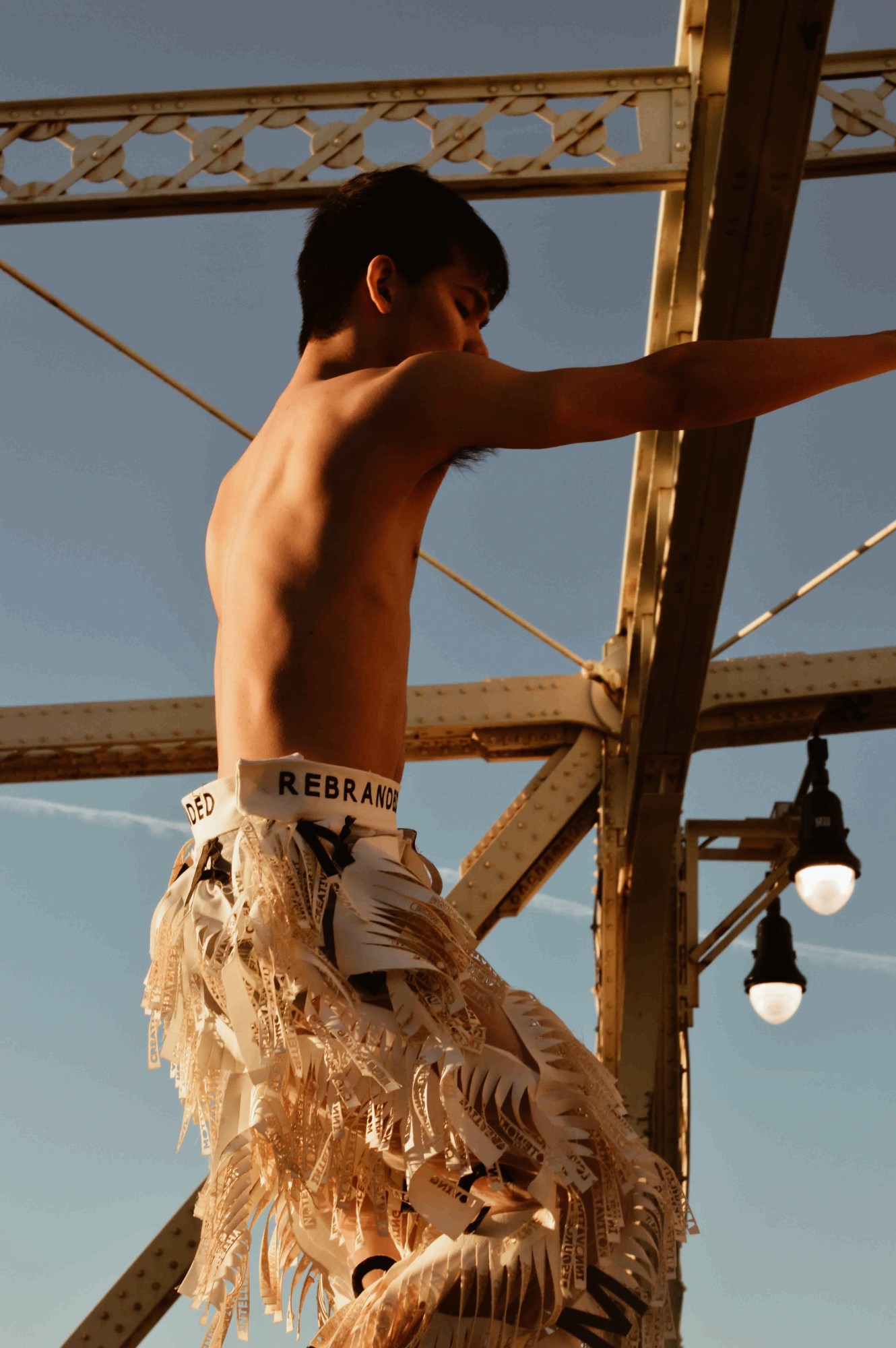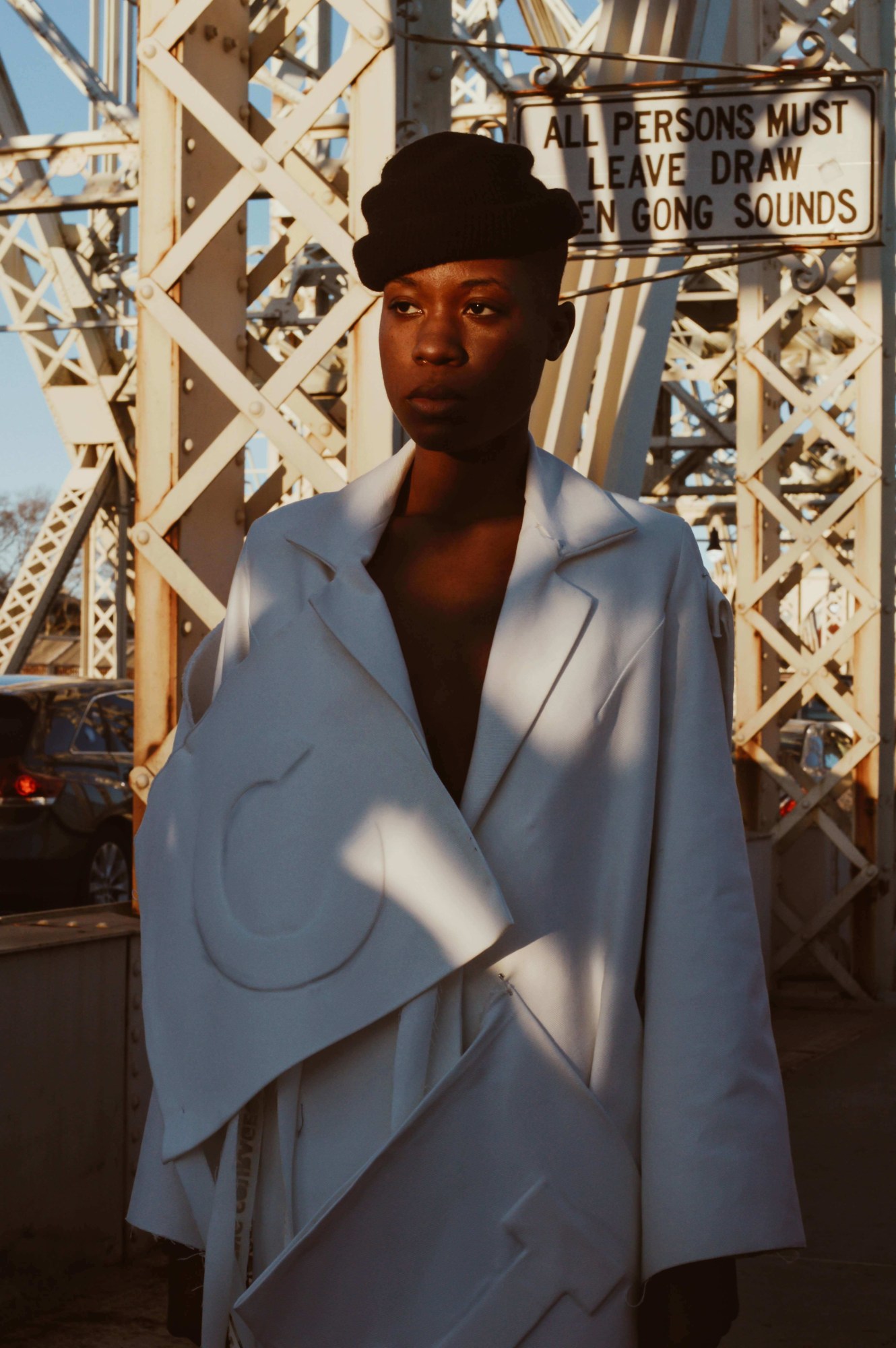In May, Parsons held its 69th annual benefit fashion show featuring designs by recent graduates of the BFA Fashion Design program. With Rihanna as the guest of honor, being recognized for her commitment to educating and empowering young women, the night was a buzzy one. But one female graduate was omitted from the benefit in a seemingly last-minute decision.
“Right before I left for graduation I got an email [saying] I was cut from the show,” Joy Marie Douglas, the founder of the Rebranded collective, told i-D. “They said they found too many quality issues and they didn’t feel like it was the right audience, but really they just didn’t want to show it in their show,” she believed. But regardless of that decision, Douglas has pressed on with her collective’s mission of reclaiming and re-contextualizing terms assigned to incarcerated individuals, gaining recognition by the CFDA and others along the way.
According to Douglas, who grew up in a small town 45 minutes outside of Los Angeles, her interest in fashion started like many designers’: she sketched ball gowns and dresses as a young child. In middle school that creativity blossomed when she discovered photography. “My dad gave me a small COOLPIX camera and said if you can figure out how to take really great photos with this then I’ll upgrade you to a DSLR,” Douglas explained. After years of self-instruction she received that upgrade, and a few lessons from an uncle who was a professional photographer.

Photography proved key to Douglas’s move to New York. Her acceptance to Parsons was based on the strength of her photography portfolio. But, when it came time to declare a major, she stuck with fashion. “Once I moved to New York, [fashion] became more about how things are created and how fashion impacts our society and the way we act,” Douglas said. “I feel it’s a nice marker for what is going on in history at that time.” But her time in New York and Europe, where she studied at Central Saint Martins, changed that view even more.
“When I studied abroad, I experienced a different self-identity in Europe,” Douglas said. “As soon as I got to Europe I was very aware of myself and my blackness and who I was there.” One of her professors in London commented on how, as an American, her native country had no history compared with the legacies of European countries. As a person partially of African descent, Douglas also felt little sense of history in terms of her African ancestry as many black Americans are unaware of their specific roots.
These questions of identity coalesced with what she saw happening back Stateside, with the Black Lives Matter movement. It lead to a growing frustration which manifested itself in projects like one based on why the British Museum separated the Egyptian section from the African section, even though Egypt is in Africa, and why the latter region’s galleries are substantially fewer.
“I kind of became like that angry black girl in the class,” Douglas said, nodding to an age-old stereotype. “I was so frustrated and someone would say something in class and I would speak up like ‘No, that’s not okay and this is why.'”

“One of my professors once told me that there were three types of designers,” Douglas continued. “The sculptor who is based on making silhouettes, the reactionary who is focused on reacting to what’s going on at that time, then there’s the decorator who just likes to decorate. Sometimes you’ll have designers that take a bit of both or all of them but usually people fall in one and he said that I fell in the reactionary category and that I should go full force.” Rebranded reflects that effort.
Started as her thesis collection, Rebranded is an attempt to redefine and reclaim the identity of people who have served time. But as Douglas herself had not, her initial plan was to interview former inmates and members of their community, asking about the effects of incarceration. Over time, those interviews turned into a truly collaborative process, and hit surprisingly close to home for Douglas.
“I reached out to a family friend who was a correctional facility officer and he connected me to another family friend to talk about their experiences,” the designer explained. “But then my dad spoke up and told me he had served time and I didn’t even know! So I had this long conversation with him.” After the conversation, Douglas gave her dad a garment to customize, instructing him to write notes about everything he did and why. This, and collaborations like it, became the beginning of Rebranded.

While it started as a collaborative graduate collection with the three former inmates — Alicia Lewis-Mitchell, Harry Douglas, and June Jones — over time, the project blossomed into a full-on collective, bringing in models and photographers and other designers, who each drew on their own experiences. “It actually started to take on a name when it became a collective,” Douglas said. As of now, there are roughly six members of the group. “We all do projects around criminality and the criminal justice system.”
While Parsons decided that the project wasn’t one they wanted to show at their 2017 benefit, the AARP awarded Douglas the Fashion Disrupter Award as some of the project’s participants were over the age of 50. The CFDA went on to select her for the Fashion Future Graduate Showcase, which represented the top fashion design graduates across the nation. While these accolades are important, they pale in comparison to the effects Douglas and her team can have on their collaborators, like Rebranded’s recent partner Messiah.
“We’re already working on a collection where he’s the main voice,” Douglas said, explaining that Messiah’s sister had reached out to say that Rebranded sounded exactly like what he needed. “He has ownership of whatever he creates so he could go and market it or sell it or do whatever he wants with it. We’re just there for guidance and assistance as trained designers. We help take these abstract ideas and make them a reality.”
Credits
Text Mikelle Street
Images courtesy of Rebranded
